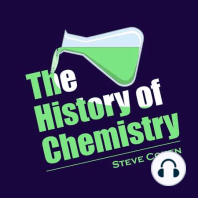18 min listen
46: Polythene Pam
ratings:
Length:
22 minutes
Released:
Dec 31, 2022
Format:
Podcast episode
Description
Here we start with more polymers popularized in the 1920s through the 1940s and beyond: polyvinyl chloride, or PVC, invented by accident in 1835 by Henri Regnault but made practical by Waldo Semon nearly a century later; polyethylene (polythene), invented by Hans von Pechmann, but commercialized by the mid- to late 1930s by ICI employees Eric Fawcett and Reginald Gibson; high-density polyethylene by a three separate teams in the early 1950s, causing a patent problem; acrylic by Rowland Hill, John Crawford, and Otto Röhm in 1933. On the inorganic side of polymers, Albert Ladenburg found the first silicone in 1871 but didn't quite understand it. Better knowledge came with Paul Kipping 30 years later and James Hyde 30 years after that. We end with polystyrene and polyethylene terephthalate (PET). Supporters of the podcast at Patreon can download a supplemental sheet to see the chemical structures of these materials.Support the show Support my podcast at https://www.patreon.com/thehistoryofchemistry Tell me how your life relates to chemistry! E-mail me at steve@historyofchem.com Get my book, O Mg! How Chemistry Came to Be, from World Scientific Publishing, https://www.worldscientific.com/worldscibooks/10.1142/12670#t=aboutBook
Released:
Dec 31, 2022
Format:
Podcast episode
Titles in the series (100)
5: The Rise of Khemeia by The History of Chemistry
